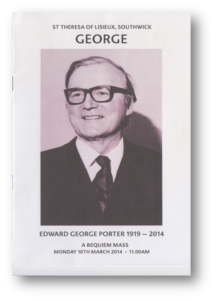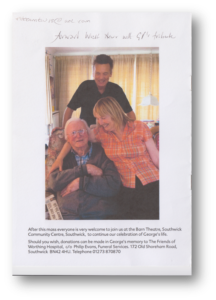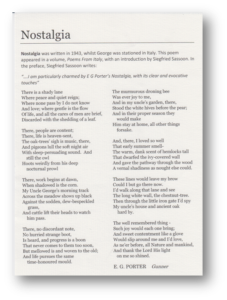In Memory of
George Edward Porter
16 . 10 . 1919 – 24 . 02 . 2014


VERSES FROM GEORGE | Introduced and read by Sue Chaplin, Richard and Charles Porter
Sue Chaplin: “Welcome to a celebration requiem for Dad, Dad had requested a requiem mass – when discussing the service, I made no mention of what might precede it. Had he known, he would doubtless have said “Crikey Richard….keep it brief”. Crikey being one of his favourite words ……..the other being ‘Gormless’ as in any person who cut him up on the road was a ‘Gormless twit’.
Dad wrote essays and poems throughout his life, on every topic from young love, war, friendship and loss, to satire and comment on pomposity, pretension and human injustice – all periods of his life are conjured succinctly and beautifully, his humanity and personality are evident in every line.
In paying tribute to Dad, we hope that by using his own words, wherever possible, we can do justice to this truly ‘Renaissance Man’
To start, we have selected two poems to read to you.
The second poem,’ HAPPINESS IS’, read by Sue, was one of many he wrote about his childhood. It is taken from his self-published book GROWING UP IN WEST NORFOLK – we include it as it was the last poem he read out loud to his group at the day centre in Shoreham.
The one you will hear first is ‘NOSTALGIA’, read by Charles, written in 1943, whilst stationed in Italy. 
This poem first appeared in a volume :
POEMS FROM THE C M F, PUBLISHED BY THE EIGHTH ARMY
It was then published in a volume :
POEMS FROM ITALY, with an introduction by SIEGFRIED SASSOON.
In this preface, Siegfried Sassoon writes “….I am particularly charmed by E G Porter’s Nostalgia, with its clear and evocative touches”
Dad was not given to pride or self-aggrandisement, in fact, apart from my mother, Jean, I don’t think he had told anyone else of this accolade. However, such words from a literary hero gave him great, quiet satisfaction.
A TRIBUTE for GEORGE – Read by Judith Berrill and David Creedon at George’s Requiem Mass on Monday 10th March 2014 at St Theresa’s Southwick
George was the second of four children born to Ted and Winnie Porter. Edwina, the eldest, was born in December 1916; George in October 1919; William, known as Bill, born in December 1921 and the youngest, Alan, was born in August 1923.
His idyllic childhood, growing up in Norfolk, and his love of its nature and landscape remained a central reference to his life. Some of his happiest memories were of big skies, idle days and cycle rides through the fens. Likewise his experiences in the war informed his philosophy and observations on human nature, throughout the following 70 years.
George recalled, in an article about his early days in Norfolk, this childhood meeting:- his matriarchal Grandfather, Arthur Herbert Mickelburgh, was Steward at Valley Farm, Hillingdon – George’s birth place. The 700 acre farm was included in the Royal Shoot from nearby Sandringham. He wrote – ‘one of my first memories was walking with my Grandfather out of the garden gate and past the cart shed where the King ( George V) was sitting…..His Majesty called out “Mickelburgh, give the lad a ride on my pony”. I was taken across to the pony but refused to be lifted on it, much to everyone’s amusement’, he later went on to relate that the king said “Well if you don’t like the horse, my lad, have some bread and cheese” ‘rather overawed I waited while a hamper was opened and was soon retreating through the garden gate clutching the biggest hunk of bread and cheese I’d ever seen.’
This surely must be the root of George’s lifelong terror of horses and his love of bread and cheese.
He left his grammar school in 1936 and in 1937 he moved to Boston, Lincolnshire, to what he described as ‘a new life’. He was working in the District Engineers drawing office, on Drainage and Pumping systems. He lodged with a family of staunch Catholics – Mrs McGuire, ‘….a lovely Lady and a beautiful cook’.
This point being quite pertinent as George allied himself to good cooks his entire life. His mother had been superb, his much loved Aunty Em, likewise and it is certain he would have sampled his proposed mother-in-law’s Treacle Sponge, before he proposed to Jean, her daughter. His fellow lodger, in the McGuire household, he described as: ‘an architect, a musician and a lover of the countryside…..he had his own piano in the front room and played Chopin and Mozart’.
This man, Alan Potts, went on to be a great influence. Several years later he was instrumental in George meeting Jean – Alan dragged him along to a local drama society – he played an 18th C. Dandy, Jean was Lady Teazle, in Sheridan’s A School for Scandal.
Early opinions of each other were not favourable – she thought him pompous, dry and way too serious, he thought her ‘snooty’ and way too frivolous. …..they celebrated this difference for 60 years!
Whilst Alan was introducing George to the delights of Am Dram and the feminine charms of a certain Lady Teazle, George was also resuming his career as an ace cricketer. As a school boy he had been awarded a much prized cricket ball for having the longest throw in the school – over 100 yards. He had gone on to play, with some acclaim, for his home side, Dersingham, in the West Norfolk League; and now, through the McGuire family’s son, another George, he signed up to play for the Boston Evening Cricket League. He records some success:- “I achieved some notable bowling feats…..on one evening taking seven wickets for four runs”
Many years later, having relocated to Sussex, living in Henfield and once again resuming his cricketing career, he was selected for an away match in Brighton, to be played in the grounds of the old Sacred Heart Convent in Hove. Jean, not being that interested in the match, went off to ‘shop’ – later that afternoon, she had forgotten where she had left him. She explained to a police officer, at Brighton station, that she had left her husband playing cricket behind a high flint wall…..she enjoyed her tour of Brighton and Hove in the back of a police car……in search of the high flint wall.
Army Days
George spent 6 years in the army – four and a half on active service. He was a Gunner in 192 HAA Battery of the 69th HAA Regiment – within the 8th Army. In this time he served in North Africa, at Tobruk and later in Italy with a short spell for convalescence in Jerusalem. Throughout he channelled his horror and homesickness into reading and writing. He was a co-editor of Essayak, the Battery newssheet. This publication was intended as light relief for the troops and, as editors, they accepted contributions, both lewd and serious from any serving personnel; it became an extraordinary, funny and sometimes heart-breaking record of life in the army. It was supposed to be destroyed when each new publication was posted so as not to leave evidence for the enemy, in the event of their mobilisation. George, ever the subversive, kept every issue.
In 1944 THE OVERSEAS DAILY MAIL carried a piece, bi-lined as ‘THE OTHER SIDE OF THE WAR’, where it speaks of the various regimental News Sheets and their value to posterity.
“ ….A thrilling symposium is the six months collection of News Sheets called ESSAYAK issued by the 192 Battery while in Tobruk …”
Going on to say: Though forced to leave Tobruk somewhat hurriedly in June 1942, the Battery continued weekly publication of Essayak without a break under the editorship of Second Lieutenant David Birch and Gunner E G Porter. This mock advertisement appeared in the sheet published at Helfaya on June 10th “FOR SALE. Comfortable four-pit and Command Post Gun Site at Tobruk. Offers to 192 HAA Battery – if you can find them…”
George gave copies of these sheets to the London Imperial War Museum – he went on to assemble and publish three collections for distribution amongst surviving comrades. It was during this time that he started writing to his literary heroes. He maintained a correspondence with Henry Williamson up until he passed away in 1977. Another, although briefer, correspondent was Evelyn Waugh.
George did not enjoy the war, he made the most of every situation and opportunity, he observed, recorded and photographed, but he was homesick, and insecure throughout. He, however, would have agreed that the experience became pivotal in forming him. The seeds were sown for his conversion to Catholicism; in Italy he discovered Verdi and Opera and he formed deep friendships that carried him through his life. Most notably, Denis O’Neill, another staunch Catholic – undoubtedly a huge influence on his Catholic conversion.
27 years later when George directed the musical satire on the first world war – Oh What A Lovely War, he wrote in his Programme note:- “I am anti-war…..I’m not against Haig or any other leader. I am pro the common soldier and that makes me slightly anti-establishment”
After demob, he returned to his career and training as a civil engineer. As previously stated, Alan Potts had introduced him to Drama and this in turn introduced him to Jean. In a poem that charted his friendship with Alan, and written shortly after Alan’s untimely death, aged 48, he relates the transition from East Anglia and old friends, to his new life in Sussex.
The poem concludes:-
‘………But theatre soon changed my life
Because I took an actress wife.
Eccentric Alan, dressed in tweeds,
A Norfolk jacket, hand made shoes……
At my wedding he wore plus fours-
A point my mother-in-law deplored.
Migrating to the Sussex Coast
With wife and child, I broke the ties
With Boston and those Fenland Ghosts
Of pre-war years which would arise
And bring regrets of friendships lost.
I turned my face, not looking back.
But later had to count the cost
In dim remembrance and dearth
Of older friends and one who died.’
The child was Susanna, Sue, born in ’49, and the migration to Sussex was for a post as chief engineer at the West Sussex River Authority, later to become Southern Water. They settled briefly in Henfield before moving to Shoreham in 1953, shortly after the birth of Richard in ‘52.
It is at this point that when reading his diaries, memoirs and press cuttings etc., one is astonished that any one person could be involved in so much. His professional life saw him forging links with all the land owners and farmers in West Sussex, towards managing the water systems through their properties, whilst at the same time designing major flood defence projects like the Adur Sluice gates.
A bi-product of this was his enormous collection of bottles assembled from the river banks. Parallel to this professional world were his interests in the Church and Theatre.
Young Wick Players – Wick Theatre Company
In 1955 Jean and George joined what was then the Young Wick Players, George rarely acting but frequently directing. From about 1960 he became involved with the under 21’s. The West Sussex County Council had appointed a Drama Advisor and this saw the wider development of competitive drama festivals to County level. George became involved in the administration and that lead to his directing. Ray Hopper, one of those early under 21’s writes: “…I cannot stress enough what wonderfully exciting and educational experiences these festivals were for our under 21’s, and indeed for the adult group.”
Amongst Ray’s archive he has found a Brighton & Hove Gazette review, by Walter Hicks, writing as THESPIS. It is for the 1961 adult entry in the Southwick Drama Festival – Tea and Sympathy by Robert Anderson. Under the bold type headline YOUNG WICK WINS DRAMA FESTIVAL, Thespis wrote: “Inspired direction by George Porter” providing a “moving and intelligent production” and “Laura…..was played quite outstandingly by Jean Porter”.
The themes of Injustice, The Outsider and Persecution were recurrent in George’s productions – whilst for the adult company he would select scripts such as, Tea and Sympathy and Robert Bolt’s A Man for all Seasons, he would then challenge the youth section with a play as harrowing as Georges Bernanos’s The Fearless Heart, set in a nunnery during the French Revolution.
In the midst of all this concern for youth (Jean was working with a community youth group in Sompting), Jean and George decided to have a third child.
Charles was born in September 1963. This became part of an historic ‘Hat Trick’ of births, as three Wick couples – Jean & George; Betty & Ralph Dawes and Betty & Ian Elliott, all produced offspring within three days of each other – Amanda Dawes and Charles arriving on 7th September and Mark Elliott making up the triptych for the Shoreham Herald photo, on 10th September.
George continued to direct for the company for 35 years, directing 18 main house productions in addition to all the ‘one act’ festival work. He had a passion for Irish Drama, in fact Irish literature in general – volumes of short stories by Sean O’Faolain and Elizabeth Bowen sat on the shelves alongside play scripts by O’Casey and Synge.
He championed the work of contemporary playwrights and was quite prepared to push the boundaries of what was seen on the barn stage, both in the style of presentation, as with the first Arena production at the Barn, Anna Christie as far back as 1964, and content, with the Peter Nichols black comedy A Day in the Death of Joe Egg, dealing frankly with childhood disability and its devastating effects on a family – not an easy choice. The aforementioned Oh What A Lovely War was another example of a mild man wishing to make an uncomfortable point in an entertaining way.
George’s involvement with the Wick, lead to his voluntary work with Southwick Community Association, taking several guiding roles over 50 years – Chairman of the Trustees, Hon. Secretary and latterly, President. One of his last contributions was to oversee the launch of the Millennium Development project – a legacy for the educational and social life of Southwick.
Order of the Knights of St Columba
George joined the Order of the Knights of St Columba in 1947 at Boston in Lincolnshire. During that time he served as the Grand Knight (Chairman) of the Council and after 5 years he moved to Brighton. Ten years after joining Brighton he joined the Council at Shoreham where he served until 2003. During that time he held Provincial office as Warden for 11 years and then as Provincial Chancellor from 1975 to 79. As the Provincial Chancellor he was responsible for the welfare of all members and their families in the county of Sussex. In 1981 George was awarded the KSC Medal for Meritorious Service which recognises members who make an outstanding contribution to the Order. George continued his membership of the Order, unbroken, for 67 years. He is well remembered by brothers as being a gentleman and a pleasure to work with.
In the 1950’s he became an active member of this very church, St Theresa’s. He sang in the choir, edited the newsletter, helped establish STYG, the youth group and, once retired, he ferried the elderly to and from Church.
Music love
It is impossible to contemplate George’s life without music. His taste was vast. He loved the Big Band sounds of GLENN MILLER, he could sing most numbers from CAROUSEL, as he could also sing every note and quite possibly knew every girl, in ‘A PRETTY GIRL IS LIKE A MELODY’ – from the Ziegfield Follies. He knew virtually every major church choral work from TAVERNER through to show stoppers like the MATTHEW PASSION and the VERDI REQUIEM. He bought every SIMON AND GARFUNKLE recording and even astonished the family with a copy of ‘THE HANGMAN’S BEAUTIFUL DAUGHTER’ by THE INCREDIBLE STRING BAND, back in 1968.
However as he aged, he became ever more the minimalist – trio and quartet, replaced orchestra and chorus. He considered some of the finest moments in any opera to be the Farewell quintet and the trio ‘Soave sia il vento’ from Mozart’s Cosi Fan Tutte.
We leave you with an entry from one of his memoirs.
‘In the 1960’s Jean and I were invited to Glyndebourne Opera with the Penney’s – ‘Don Giovanni’ was the first experience and thereafter George Penney took us to at least one Opera a season and we thoroughly enjoyed the dressing up, the picnic hamper and the balmy evenings. Very rarely did a cloud appear. The Penneys always liked to share their pleasures and on one occasion ’Molly’ invited me to Covent Garden to see Beethoven’s one great opera ’Fidelio’ under Furtwängler.
Although Verdi had been my first love, through attending Glyndebourne, Mozart became my late love. But overall my tastes have widened so that I have come to some degree educated – from playing a mouth organ in the Desert to enjoying Beethoven’s last quartets is no mean step.’
Ever the modest man.
Wick’s April News Letter carried the following.
On Monday 10th March a large congregation, including many current and past members of Wick, gathered at St. Theresa’s Roman Catholic Church in Southwick to say farewell to George, a great contributor to Wick and Southwick Community Centre life. As part of his Requiem Mass we heard a detailed tribute to George, lovingly prepared by his family, and read by Wick members David Creedon and Judith Berrill, some extracts from which are included here.
We heard of his idyllic early life in Norfolk, including an encounter with George V on the Sandringham estate, which led to George’s lifelong love of bread and cheese! Some of us were surprised to hear that the was an accomplished cricketer, but were more familiar with his wartime experiences with the 8thArmy, his poetry, his post-war meeting with his beloved Jean and introduction to Amateur Dramatics, plus his conversion to Catholicism. He became a member of the Catholic Order of the Knights of St. Columba and remained a member for 67 years, receiving their Medal for Meritorious Service in1981.
We also heard of his early career as a Civil Engineer with the Rivers Authority and his move to Sussex in 1953, followed by he and Jean joining the Young Wick Players, as we were then, in 1955. After a couple of minor acting roles, George began his directing career in 1957, and over the next 36 years directed 18 main productions and innumerable one act plays as entries to the many drama festivals which we entered. In the late 1950s West Sussex County Council appointed a Drama Adviser, and George worked closely with him to set up and organise the annual County Under-21 drama competition. As I have written elsewhere “I cannot stress enough what wonderfully exciting and educational experiences these festivals were for our under 21s.”
George had a passion for Irish Drama, in fact Irish literature in general – volumes of short stories by Sean O’Faolain and Elizabeth Bowen sat on the shelves alongside play scripts by O’Casey and Synge. His triumphant co-production of “Riders To The Sea” will never be forgotten by those of us who saw it. He championed the work of contemporary playwrights and was quite prepared to push the boundaries of what was seen on the Barn stage, both in the style of presentation, as with the first Arena production at the Barn, Anna Christie as far back as 1964, and content, with the Peter Nichols black comedy A Day In The Death of Joe Egg, dealing frankly with childhood disability and its devastating effects on a family – not an easy choice. Oh What A Lovely War was another example of a mild man wishing to make an uncomfortable point in an entertaining way. It seems particularly fitting that his last production for us, (jointly with Charles), Travesties, was yet another Festival winner.
George’s involvement with the Wick led to his voluntary work with Southwick Community Association, taking several guiding roles over 50 years – Chairman of the Trustees, Hon. Secretary and latterly, President. One of his last contributions was to oversee the launch of the Millennium Development project – a legacy for the educational and social life of Southwick.
Space prevents a more detailed evaluation of George’s contribution to our company – but what a wonderfully full and long life he enjoyed. I feel so privileged to count him as a friend.
Ray Hopper



